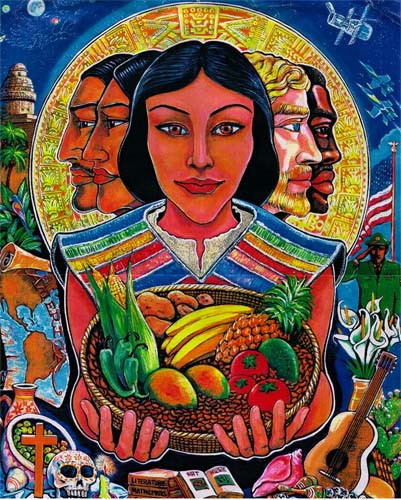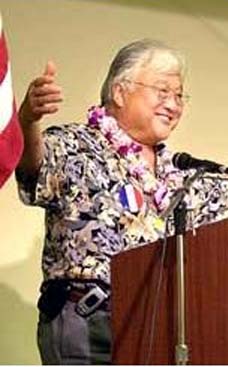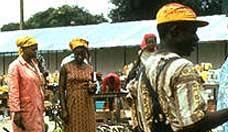
Imagine being given the opportunity to live 27 months of your life in a foreign country. Sounds like a dream come true, right? But what if during that time your task was to live among the more disadvantaged people of that country, helping them improve their society by teaching them things such as farming techniques or computer skills. Still sounds like a dream come true? For about 140 current Latina Peace Corps volunteers it is.
Latinas in the Peace Corps
A Legacy of Service
LatinaStyle magazine
May/June 2005
Imagine being given the opportunity to live 27 months of your life in a foreign country. Sounds like a dream come true, right? But what if during that time your task was to live among the more disadvantaged people of that country, helping them improve their society by teaching them things such as farming techniques or computer skills. Still sounds like a dream come true? For about 140 current Latina Peace Corps volunteers it is.
Since its inception in 1961, after then-U.S. Senator John F. Kennedy challenged university students to serve their country by working and living in developing countries, more than 178,000 Peace Corps volunteers have been invited by 138 host countries to work on issues ranging from AIDS education to information technology to environmental preservation. The work of the volunteers has an immeasurable impact: providing support to children orphaned by HIV/AIDS; helping farmers improve local diets and increase their income through farming techniques; working with development banks, nongovernmental organizations, and municipalities to support local development projects. "The Peace Corps volunteers, over the past 44 years, have put a positive face on America and generated economic growth and opportunities for people in their host countries," says Peace Corps Director Gaddi Vasquez.
The cultural exchange between Peace Corps volunteers and their host countries is also valuable. Not only do the volunteers gain first-hand experience of life in another country, but they also offer a window into the outside world to people who will likely never be able to see it themselves. The volunteers, in many ways, are U.S. ambassadors. "I have been very fortunate to have had the opportunity to personally see the impact that the volunteers have in the communities they work in," says Susana Duarte, the Peace Corps' chief compliance officer. "The comments were the same," she continues. "'Please send us more, we love our volunteers. They help us so much!' Taken all together, I can justly say that the Peace Corps positively affects how the world sees America and Americans. Peace Corps volunteers help change the world for the better."
Peace Corps volunteers are a diverse group: Of the over 7,700 current volunteers, 58 percent are female; 15 percent are ethnic minorities; 10 percent are serving with a spouse; and 6 percent are over the age of 50. Many Latinas have heeded Kennedy's vision over the years, among them author Susana Herrera. Today, more than 200 Latinos serve overseas as part of the Peace Corps; over half of those are Hispanic women.
Valerie León, a 27-year old Ecuadorian-American from the Bronx, N.Y., graduated from Wesleyan University in Connecticut with a degree in government, and after working for a time with the New York's Latino immigrant community providing free legal services, she decided to continue her public-service work abroad and applied to be a Peace Corps volunteer. Currently she is working in Thailand in the subdistrict government development office of Gud Nam Said. The office is responsible for the cultural, social, and infrastructure development of the subdistrict's 13 villages. "I am assigned to one of the poorest provinces in Thailand," León says. "I am responsible for capacity building within the office, which involves me working with the social programs that are already in place in the villages."
Some of León's typical Peace Corps activities are giving lessons in using the Internet and working on health promotion and programming with the local hospital and health centers, focusing on issues such as dengue and HIV/AIDS prevention.
But her duties do not stop there. León also provides assistance to various women's groups in her subdistrict, helps develop training opportunities for teachers at day care centers, and helps promote organic agriculture in the communities.
She admits that the transition to a completely different culture was a significant challenge at first. "My experiences so far have been a roller-coaster ride of emotions. I come from a place where I am fully able to express myself and develop the two cultures into which I was born," she says. "In New York City, I understand what is going on, what is being said, and why people react the way they do. In Thailand, at least when I first got here, I did not understand anything that was being said, what was going on and why people reacted the way they did."
Well over halfway into her Peace Corps tenure, things have changed for León. "As of now, this experience has given me so much more than I ever expected, not to mention all the new technical and language skills I have gained. Who would have thought the quintessential N.Y.C. Latina would know how to speak Thai, know how to grow organic rice and pick mangoes and coconuts from a tree?" she asks. According to León, what she has grown to treasure most are the new friends she has made with local villagers from her neighborhood and local officials. "Through these experiences, they have learned how to dance Salsa and eat habichuelas. I have learned how to make spicy sour Thai soup and how to dance Maw Lam. They have learned the ethnic and cultural spectrum of the United States and I have learned to be more patient, considerate of others and [to] meditate."
Through her experience, León has stayed true to her roots. "I am most proud of the fact that I am able to represent progressive thinking Latinos/ Americans abroad, whose job description is to offer peace, cultural and idea exchange, not violence."
For 24-year-old Constance Rivera, volunteering in the Peace Corps led her to leave the United States for the first time; as the Nuyorican explains it, before heading to South Africa, she had never lived more than an hour's car ride away from her family.
A graduate of the State University of New York at SUNY at New Paltz, Rivera is a health volunteer in the Gambia, where she is tasked with dispensing health information to her community and training health staff. Specifically, she works in with a peer health group at an area school where she discusses health and sex education with ninth-graders. "After we have a lesson, the students will go into their communities and perform skits based on what they have learned. This way the information does not just stay with them, but reaches others as well," she says.
Rivera also spends time at a women and girl's skills center and a local health center. At the skills center, which is in its beginning stages, Rivera hopes she will be able to teach women skills like sewing and soap making so that they will be more financially independent from their husbands, as well as to mentor schoolgirls with their homework offer health information.
At the local health center, she participates in polio immunization campaigns, mosquito net dipping and personal hygiene trainings for nearby communities. "There are a lot of simple behavioral changes that people could do here to prevent a lot of illness, but they really don't know. We try and dispense information that is applicable to their daily lives and will hopefully make a difference in the quality of their health," says Rivera.
Eventually, after her two-year tour is completed and she returns to the United States to continue her education, Rivera says she hopes to work in the development field. "I am particularly interested in women's development," she says. "My experience here will absolutely be instrumental in future career plans. More than that though, this experience has already made me a more patient and flexible person. I know I will take those traits back to America with me."
The Peace Corps experience for Cristina Finch, 27, has also been a roller coaster. But Finch's situation is a little bit different. This native of Maryland, who holds a master's degree in city planning and civil engineering from Georgia Institute of Technology is also a newlywed-and currently serving in El Paraíso, Honduras, with her husband of 22 months, Kevin.
After becoming engaged in 2002, Cristina and Kevin say, they started looking into opportunities to work or volunteer that fall. "Many volunteer positions we researched were for one year or less or it seemed the organization in charge dropped you off in the country and offered little support thereafter. Peace Corps was appealing because we felt a two-year service would give us a better opportunity to learn about the culture and the situation of the people in the country," explains Cristina, who is of Cuban and Peruvian descent. "In the U.S. we grew up with opportunities that people in developing countries don't have and we wanted to try to help others who aren't as fortunate," she adds.
In El Paraíso, Cristina is a municipal development volunteer. As such, she works for the local government, local schools, and the culture center. "I've been lucky to find projects in my field. For example, I am helping a local councilman improve the traffic situation in El Paraíso, including designing the traffic pattern and installing signs," she says. She is also training two employees of the local government to use computer programs such as Excel and ArcView, a mapping program, and she has helped create a women's employee club within the local government that meets once a month at a local café to socialize and talk about work. Her husband is a health volunteer working primarily in the local schools and the local health center in HIV/AIDS prevention. Last year the Finches gave fifth- and sixth-graders a 15-week course on self-esteem, values, sexuality, and HIV/AIDS prevention. "One great thing about being married in the Peace Corps is that we have the opportunity to work together," says Cristina.
Cristina says that one of her greatest hurdles has been dealing with her frustration at seeing so many people struggling, so many problems, and realizing she can't do it all. "In our work, we always have to re-group, re-evaluate, and try again. Setbacks are a way of life. Working in a society that lacks money and resources makes development and change slow. As Americans, with our fast-paced lifestyle and a we-can-fix-anything attitude, this is challenging," she explains.
For these Peace Corps volunteers, the overseas experience of living in another country, breathing in its culture, and learning a new set of traditions and customs will no doubt change their outlook of life. For Sayuri Beltrán, who volunteered on the island of Grenada from 1993 to 1995, the experience made her want to become a lawyer. The 33-year-old Peruvian-Japanese-Mexican-American Texas native was on track to become a teacher when she graduated from the University of Texas in Austin with a degree in elementary education and entered the Peace Corps. She recalls growing up listening to her godmother's husband, who had been a volunteer, tell stories about his experience. Since the fourth grade, she says, she was fascinated with the idea of the Peace Corps. "From the moment I went into college, I knew that was going to be the next step thereafter," she says.
In Grenada, Beltrán served as a teacher trainer assigned to "lower" schools, which were equivalent to combined K-8 schools in the United States. In this capacity, she would instruct Grenadian teachers about U.S. methods of comprehension. One of the challenges Beltrán encountered was the lack of formal university training the teachers had received to become teachers. According to Beltrán, the vast majority of teachers were not trained at the university level. "A lot of people were teaching the way they were taught," she says, adding that those methods did not necessarily translate into the most effective way for children to learn.
There were also cultural differences between the U.S. way of teaching and methods used in Grenada that Beltrán found difficult to become accustomed to. "I presumed the American way was the best way [to teach] but there are cultural differences," she says. "Some of the things [U.S. teachers] do don't translate into their methods. I found I was more effective my second year because I was able to accept certain limitations we did have."
Once she returned to the United States, Beltrán found that her experience in Grenada had shifted her career plans: She realized the power of knowledge, and she couldn't think of anything better than studying law. Even better, her new career path has allowed her to continue helping others. "There's a lot of injustice, not only here but abroad," she says.
For information on how to volunteer with the Peace Corps, visit www.peacecorps.gov or contact your local recruitment office at 1-800-424-8580.











